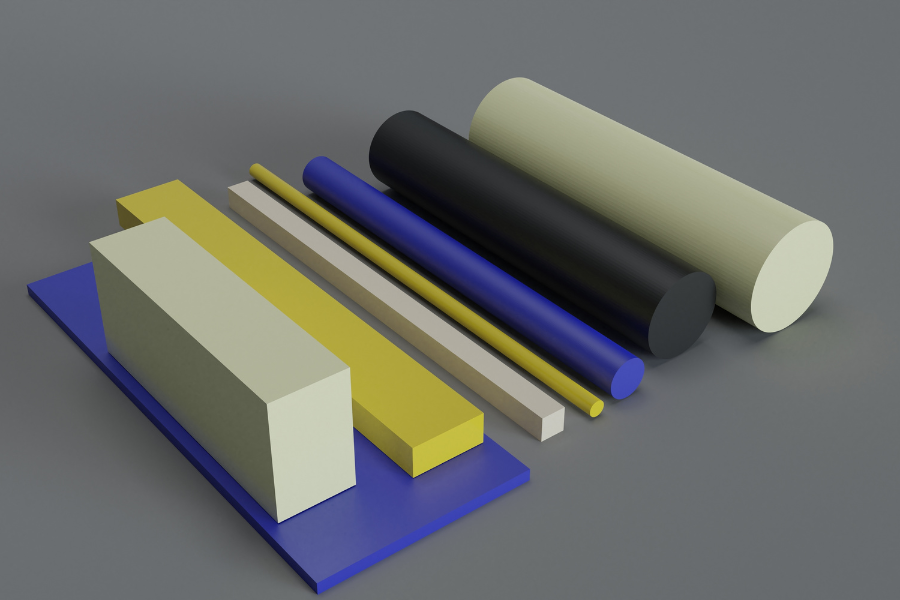Armorlene® is recognized as a premier material with a wide array of applications across various industries. Contact a CDI Materials Expert today to explore how the Armorlene® material suite could deliver significant benefits for your specific industry or application.
Engineered To Endure The Stringent Requirements Of The Aerospace Industry
The Armorlene® material range consists of a proprietary material based on high quality Polytetrafluoroethylene (PTFE) fluoropolymer resins. Fillers are added to enhance material performance and properties. Before we look at the properties of Armorlene®, let’s first look at what PTFE is and some of its innate characteristics.
Polytetrafluoroethylene (PTFE) is a synthetic fluoropolymer of tetrafluoroethylene. PTFE is a soft, low-friction fluoropolymer with excellent chemical and weathering resistance.
PTFE is a very versatile material with a wide range of applications due to its hydrophobic, non-wetting, high density, and resistance to high temperatures. It is arguably best-known for its non-stick qualities.
PTFE is temperature stable up to 500°F and is commonly utilized in high-temperature situations. PTFE offers great electrical insulating characteristics as well.
There are several forms of PTFE available, including unfilled, glass-filled, bearing, and FDA compliant grades.
Characteristics like chemical inertness, heat resistance, excellent electrical insulation, and a low coefficient of friction enable PTFE to be used in a wide variety of applications, including seals, gaskets, wire insulation, insulated transformers, printed circuit boards, textiles, and surface coatings.
You can learn a bit more about PTFE on our blog article PTFE: The Wonder Thermoplastic.
Low Friction
Armorlene® materials display the lowest coefficient of friction of any known solid and have a low static coefficient of friction. This results in a low breakout friction and a material that does not adhere to their mating surfaces, stick-slip dynamic application is eliminated.
Chemical Compatibility
Armorlene® materials are chemically inert in virtually all media, even at elevated temperatures and pressures. They are therefore compatible with an extremely wide range of solvents, acids, and other aggressive media.
Temperature Range
Armolene® materials are available to operate in temperatures from -450 F to +500°F (-268°C to +260°C) and will survive temperature spikes of up to +680°F (+360°C). It is important to limit other operating conditions when approaching these temperature limits.
Temperature Cycling
Armorlene® materials are not altered or adversely affected by temperature cycling.
Degradation
Armorlene® materials do not contain plasticizers or any other ingredients which could degrade at temperatures below +572°F (+300°C).
Surface Speed
Armorlene® materials generate significantly less frictional heat than other plastic materials. Depending upon the seal design and other operating conditions, the surface speeds between the surface in contact and the seal can be up to 49.2 ft/s (15m/s). Speeds exceeding 65.6 ft/s (20 m/s) have been achieved under certain conditions.

Aging
The properties of Armorlene® materials do not significantly change over time. Armorlene® will not become brittle or degrade when exposed to severe-weathering conditions such as heat, light, water, or salt spray. This is a benefit when actuators are stored or seals are packaged or left idle for long periods of time, even years, and still need to perform with complete reliability. Armorlene® material has unlimited shelf life.
Resilience
Armorlene® materials do not display the resilience of elastomers. These materials may experience cold-flow or creep under continued thermal or mechanical stress. Therefore, Armorlene® seals require either an elastomer element or a spring to provide a radial force. The radial force will compensate for seal wear, cold-flow, and the normal variations in gland dimensions due to the range of tolerances or eccentricity.
Wear Resistance
Armorlene® materials display superior wear resistance and they exceed the demands of even the most challenging sealing environments. This extends seal life at high speeds, pressures, and temperatures.
Radiation
The molecular-chain structure of PTFE can be damaged when exposed to radiation. This damage can lower tensile strength and potentially lead to seal disintegration. Therefore, Armorlene® materials are not recommended for an accumulated radiation dose above 7 x 104 rad (7 x 102 Gy). In high-radiation service other fluoropolymers are recommended.
Electrical Properties
Armorlene® materials have excellent electrical properties which include a low dielectric constant and even at elevated temperatures, a very high dielectric strength.
For applications where electrical conductivity is required, Carbon powder, Carbon fiber and Graphite filled Armorlene® materials are recommended since these fillers contacting the structure assist in electrical conductivity through the material. Click here to see examples of applications where electrical conductivity is required.
Absorption of Fluids
The water absorption of PTFE is 0.01% and it does not absorb any other fluids to a significant level. One exception is Freon, fluorinated-cooling media which can cause a reversible weight increase of approximately 5% accompanied by dimensional increases of approximately 1%.
Vacuum
PTFE has an extremely low vapor pressure of <10-5 mbar at +248°F (+120°C) and can be used safely in vacuum.
Other Characteristics
Virgin PTFE is physiologically inert.
PTFE will not sustain fire in pure oxygen.
All CDI Product Armorlene® materials are lead and mercury-free.